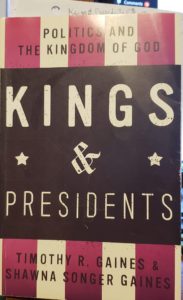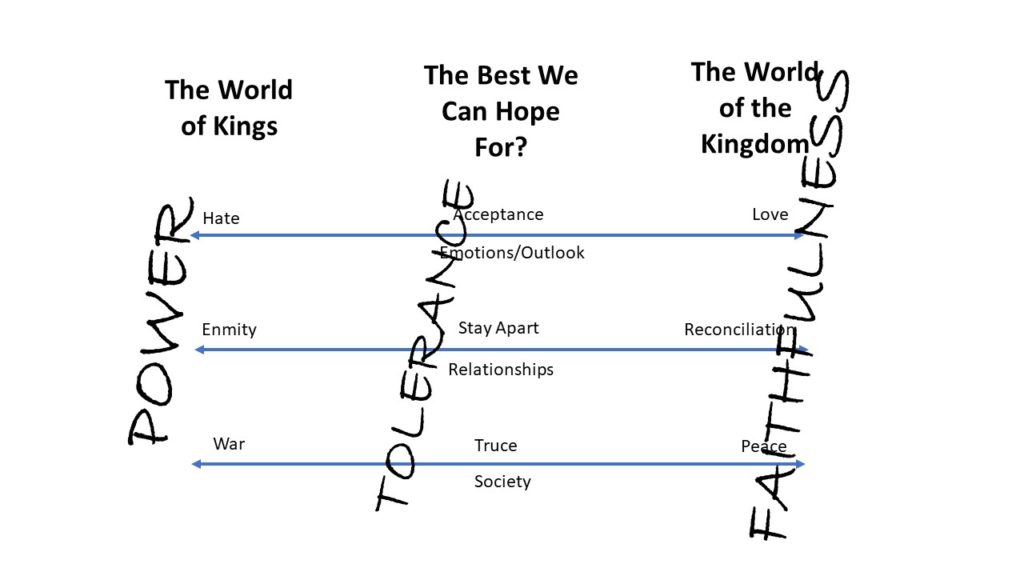
In the last month leading up to the general election just concluded (but still being disputed) in the US, our church decided to do a study of the book Kings & Presidents by Tim and Shawna Gaines. Our pastor preached on it for four weeks. All adult Life Groups were encouraged to also study it, either the four weeks the pastor preached on it or the full eight week series envisioned by the book. Our group elected to do eight weeks. When I had coffee with our pastor during the series, he said there was no way he could preach eight sermons on this material.
Let me tell you, this was perhaps the hardest lesson series I ever taught. Five of the eight weeks were mine, three by my co-teacher. Looking back, I’m glad we studied it, because I feel that we learned something, but, man, it was difficult to teach.
Tim & Shawna (T&S henceforth) developed the book following the 2012 presidential election, when they were pastoring in California. Members of their congregation were apprehensive about what would happen. The book came from the sermon series.
The book takes stories from 2nd Kings 1-7, the days of Elisha the prophet, and contrasts the workings of God with the workings of kings. The kings were unable to see what God could do, whereas the prophet always could. Messages to the king weren’t understood. In the end God always prevailed. That’s fine. But how does that help us approach politics if we are devout Christians?
The purpose for the book is stated thus in the Introduction:
Our purpose…is to offer a vision of political life that takes discipleship to Jesus Christ seriously and treats it as primary.
Okay, that’s all well and good, but how do you do that? They sort of answered that question in the Afterword:
If you’re wondering So what exactly are we supposed to do politically? our guidance would be something along the lines of: Gather with other believers, empty yourself, lovingly deliberate, humbly discern, and then go and be persistent. Engage the world according to the way of Jesus Christ in the power of the Holy Spirit. Take that vision that the ancient stories of our father open to us and act according to the world of the kingdom.
All well and good again. Except this said “gather with other believers.” If I take that literally, does that mean I should not engage in politics with non-believers? T&S do say “engage the world”, which implies we should engage in political discussions with non-believers. I think what they mean is: engage in political discussions with whoever, but don’t lose your faith over it. Come at it from a disciple point of view, not a worldly point of view. To help me help the class to understand this, I developed this chart which summarizes my understanding of T&S’s message. Hopefully I’m right or close to right. Click on the chart to enlarge it.

In the final lesson—or maybe it was in an earlier lesson—I suggested to the class that they engage in political discussions with non-believers in such a way that, immediately after the political discussion they could present the gospel to them with no loss of credibility. Maybe that’s what T&S are saying.
Here’s a quote from the last chapter of the book.
[A]t its fullest and deepest, politics has always been about being reconciled to God and to one another.
No, no, no, no, no. Unless I’m misunderstanding them, they are proposing dropping the separation of church and state. Politics (by which T&S mean both what I call politics and governance, but they don’t really define their meaning) has nothing to do, and should have nothing to do, with God. It is a secular thing. Governance is about governing, of doing what the people want as far as rules and laws that regulate human civic behavior. Politics is about getting into the position to govern. Politics and governance should be separate from religious practice. We should not be hoping for a theocracy—a blending of church and state.
T&S say some negative things about the concept of the individual. The state regulates individual behavior, they say, so that everyone has the space they need to conduct their life and exercise their rights without stepping on the rights of others. It results in tolerance of each other Yes, they seem to be a bit negative on this, although they also say,
Tolerance is not a bad thing, but we need to acknowledge that a Christian view of politics, a sanctified vision of what politics is mean for, is so much more than simply putting up with one another.
Maybe. Maybe in a world (or a subset of the world) that is 100% devout Christian that would happen. But not in the world we live in. Sorry, T&S, but I can’t grasp your vision in a secular world.
So, it comes down to two questions: do I recommend this book to you? And is it a keeper? No, I don’t recommend it. It was difficult to read and seemed a little long for the material covered. I had to read each chapter a minimum of three times before I could grasp it enough to teach it, and even then I went into each lesson feeling unprepared. As for keeping it, the jury is still out. I may keep it and re-read it before the next election, to see if seasoning by years will make the message of the book clearer and thus be more useful to me. But it is not a long-term keeper. Three stars on Amazon.
Oh, one last thought. T&S kept calling the Christian faith “subversive.” Sorry, but I just don’t see that. I thought a long time about it, but I don’t see it.
We didn’t buy the book. I have never been a fan of books written by clergy on politics. I have read some great books, on the topic, written by clergy but most miss the mark for me. IMHO we are called to love God with all of our heart, soul, mind and strength and our neighbor as our self. That second part should inform how we engage with others in the world – Christian or not. Jesus was not a political person but he artfully answered questions about faith and politics – “Render unto Caesar what is Cesar’s and to God what is God’s.” Jesus was in constant conflict with the religious/political establishment of his day and yet he made no effort to overthrow that system. His ministry was to those often left behind and to those who were open to his message. I think Christians should engage in the political process as citizens – yes our faith will inform our values and how we often vote. I think the church should not be political – I think the church surrenders her role as mediator and healer when she takes a side. Anyway, I’m not sure this book served its intended purpose. Clearly veteran life group leaders found it difficult to work with in the context of teaching.
Martin: I’m glad I read the book—sort of. Alas, I also say that I don’t feel like my life would be less fulfilled if I had never read it.